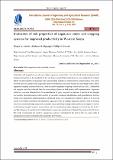Evaluation of soil properties of sugarcane zones and cropping systems for improved productivity in Western Kenya

View/
Publication Date
2017-09-30Author
Amolo, Risper A.
Sigunga, Dalmas O.
Owuor, Philip O.
Metadata
Show full item recordAbstract/
Unsuitable soil properties can adversely affect sugarcane productivity. The role of soil chemical, physical and biological properties on low productivity has not been evaluated. Soil nutrient survey was conducted to evaluate effects of soil properties of sugarcane zones and cropping systems on productivity in western Kenya. The survey involved 200 soil samples from sugarcane farms in Western (n=100) and Nyando (n=100) Sugar Zones, fallow sugarcane cropping systems (FS) (n=94) and successive sugarcane cropping systems (SS) (n=106). Undisturbed soil samples were also collected from the same selected farms for bulk density (BD) determination. Sugarcane yields (n= 144) were obtained from the selected farms for plant crop and two ratoons. A portion of soil samples was used for chemical analysis while another for parasitic nematodes identification and quantification. Soil test results were subjected to statistical analysis (SAS) and means were separated by student’s t-test at 5 %. The test results were further correlated with respective sugarcane yields by multiple regression models. Soils of Western Zone were consistently high in parasitic nematode counts and were strongly acidic, moderate in organic C but low in all nutrients except P content. Nyando Zone soils were moderately acidic, adequate in P and K but low in N, C and Mg. However, N was the most limiting factor to sugarcane production in Nyando Zone and on the FS farms. The study recommends the need for appropriate nutrient replenishment for soils in the two zones while N management is critical in Nyando Zone and under the FS farms.
Collections
- Department of Chemistry [339]
